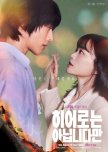Cette critique peut contenir des spoilers
Not your typical time travel story
The Atypical Family is incredibly well written with complex characters who change and grow in surprising ways. Though many of the characters are morally gray the show's lens is deeply humanistic and you'll grow to care for these very flawed human beings. The show's central message is don't regret the past or worry about the future, live in the present and love the people close to you.
Time travel is handled very differently in this show than in dramas like Lovely Runner and Twinkling Watermelon. In those shows, time travel creates different timelines and it is possible to change the past and the future. But The Atypical Family is more like the film 12 Monkeys, which has a single closed time loop. It's not possible for the time traveler to change the past or the future because their actions simply cause events that were going to happen anyway.
The closed time loop turns this into a very Buddhist story. Buddhism puts a huge emphasis on the idea of non-attachment, which means letting go of what you can't control and focusing on the present moment. There is also the central idea of loving-kindness, viewing yourself and those around you with compassion, generosity and empathy.
Gwiju starts out from a place of: I need more control, I need to control my own destiny. He wants to change his past and future and it's his repeated failures to do so that turn him into a depressed alcoholic. But after Dahae enters his life, he gradually realizes that he can't change his fate but he can change how he reacts to that fate. He can become a more loving and responsible person no matter what has happened in the past or what will happen in the future.
Gwiju isn't the only person who has to learn this lesson. Dahae needs to detach from the idea that she can avoid the pain of her traumatic past by manipulating and controlling the men she scams and instead embrace her found families. Dong Hee needs to detach from the idea that her weight has anything to do with whether or not she can fly and instead allow herself to eat joyfully and be happy. Bok Eomma needs to detach from the idea that her prescient dreams will keep her and her family safe and stop using them to control people. And even Ina needs to detach from both her fear of her mind reading powers and her belief that those powers can be used to manipulate people into giving her friendship and understand that she is a loveable and worthwhile person.
I think it's this emphasis on detachment and acceptance that truly sets Atypical Family apart from other time travel stories. What's amazing is that despite a philosophy that sounds like it would lead to stagnant, boring storytelling, the drama is absolutely gripping and the last half hour is hugely cathartic. I cried buckets at the end.
In addition to the amazing writing and the interesting philosophy of the drama, I have to shout out the acting performances which are uniformly great. Special mentions for Jang Ki Yong in his first post-military drama; Chun Woo Hee for portraying a morally ambiguous female lead and making us care about her; Park So Yi for more than holding her own with the adult actors; and Claudia Kim for humanizing a character who could've been an offensive caricature.
I also have to mention the amazing cinematography and the OST which is phenomenal, probably the most sophisticated OST I've ever heard in a drama.
There are very few things I disliked about this drama but many people struggle with the FL's behavior in the early episodes, as well as the ML's neglect of his daughter due to alcoholism and trauma. There are also a lot of people who don't understand the time travel rules in this universe and had trouble understanding the ending. I even made graphics to explain it: https://x.com/daebakpodcast1/status/1800000910699147378
Verdict: So far this is my favorite drama of the year and one of my favorite dramas ever.
Time travel is handled very differently in this show than in dramas like Lovely Runner and Twinkling Watermelon. In those shows, time travel creates different timelines and it is possible to change the past and the future. But The Atypical Family is more like the film 12 Monkeys, which has a single closed time loop. It's not possible for the time traveler to change the past or the future because their actions simply cause events that were going to happen anyway.
The closed time loop turns this into a very Buddhist story. Buddhism puts a huge emphasis on the idea of non-attachment, which means letting go of what you can't control and focusing on the present moment. There is also the central idea of loving-kindness, viewing yourself and those around you with compassion, generosity and empathy.
Gwiju starts out from a place of: I need more control, I need to control my own destiny. He wants to change his past and future and it's his repeated failures to do so that turn him into a depressed alcoholic. But after Dahae enters his life, he gradually realizes that he can't change his fate but he can change how he reacts to that fate. He can become a more loving and responsible person no matter what has happened in the past or what will happen in the future.
Gwiju isn't the only person who has to learn this lesson. Dahae needs to detach from the idea that she can avoid the pain of her traumatic past by manipulating and controlling the men she scams and instead embrace her found families. Dong Hee needs to detach from the idea that her weight has anything to do with whether or not she can fly and instead allow herself to eat joyfully and be happy. Bok Eomma needs to detach from the idea that her prescient dreams will keep her and her family safe and stop using them to control people. And even Ina needs to detach from both her fear of her mind reading powers and her belief that those powers can be used to manipulate people into giving her friendship and understand that she is a loveable and worthwhile person.
I think it's this emphasis on detachment and acceptance that truly sets Atypical Family apart from other time travel stories. What's amazing is that despite a philosophy that sounds like it would lead to stagnant, boring storytelling, the drama is absolutely gripping and the last half hour is hugely cathartic. I cried buckets at the end.
In addition to the amazing writing and the interesting philosophy of the drama, I have to shout out the acting performances which are uniformly great. Special mentions for Jang Ki Yong in his first post-military drama; Chun Woo Hee for portraying a morally ambiguous female lead and making us care about her; Park So Yi for more than holding her own with the adult actors; and Claudia Kim for humanizing a character who could've been an offensive caricature.
I also have to mention the amazing cinematography and the OST which is phenomenal, probably the most sophisticated OST I've ever heard in a drama.
There are very few things I disliked about this drama but many people struggle with the FL's behavior in the early episodes, as well as the ML's neglect of his daughter due to alcoholism and trauma. There are also a lot of people who don't understand the time travel rules in this universe and had trouble understanding the ending. I even made graphics to explain it: https://x.com/daebakpodcast1/status/1800000910699147378
Verdict: So far this is my favorite drama of the year and one of my favorite dramas ever.
Cet avis était-il utile?




















